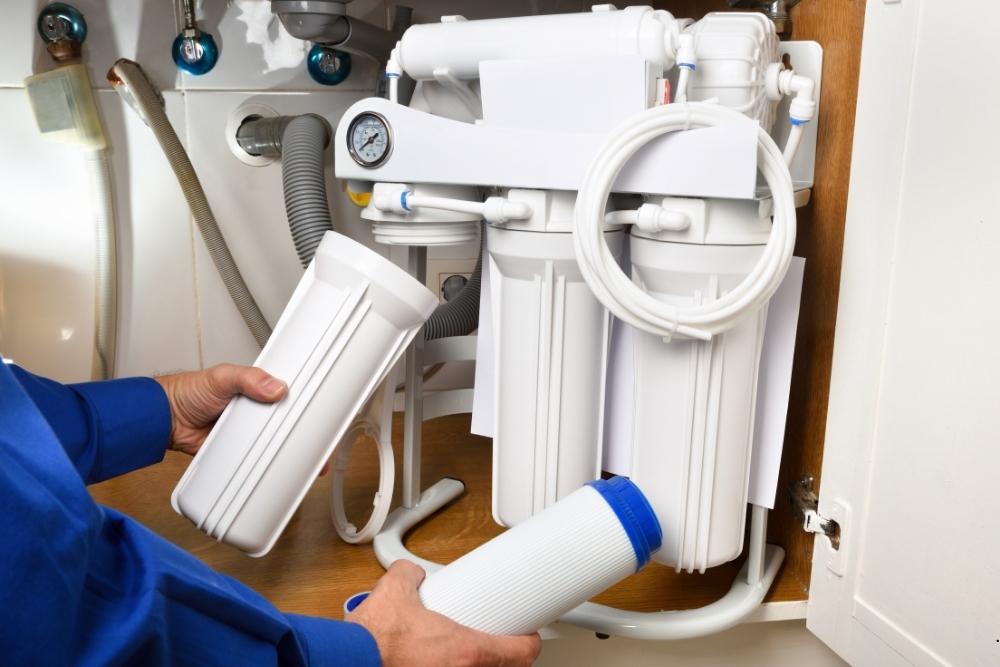Choosing the right water treatment system for your home can feel overwhelming—especially when terms like reverse osmosis and water filtration get thrown around. While both are designed to improve your water quality, they work differently and serve different purposes.
As an experienced water treatment contractor in San Antonio, TX, we understand that every home has unique needs depending on its water source, plumbing, and family lifestyle. This guide breaks down the pros and cons of reverse osmosis vs water filtration in San Antonio, TX, so you can make an informed decision and feel confident about what’s flowing from your taps.
Why Water Quality in San Antonio Matters
San Antonio’s tap water comes from the Edwards Aquifer, and while the supply is reliable, the water itself is naturally hard and can contain minerals, chlorine, and other impurities. Without proper treatment, you may notice:
- Strange tastes or smells in your drinking water
- Limescale buildup on fixtures and appliances
- Skin irritation or dryness
- Cloudy glasses and spotty dishes
- Potential exposure to contaminants like heavy metals or chemicals
Improving your water starts with understanding what system addresses these problems best. That’s where the reverse osmosis vs. water filtration debate begins.
What Is Water Filtration?
Water filtration is a general term that covers a variety of systems designed to remove contaminants from your water. These systems often use activated carbon, sediment filters, or specialized media to target different types of impurities.
Common Types of Water Filtration:
- Carbon filters: Great for removing chlorine, bad tastes, and odors
- Sediment filters: Capture sand, rust, and other large particles
- Whole-house filters: Treat all the water entering your home, not just what you drink
- Under-sink filters: Target drinking water at one faucet
Benefits of Water Filtration:
- Improves taste and smell
- Reduces chlorine and chemicals
- Protects appliances from scale buildup
- Affordable and low maintenance
Water filtration is a solid choice for homes that struggle with chlorine, odors, or sediment—but it may not catch everything.
What Is Reverse Osmosis?
Reverse osmosis (RO) is a more advanced form of water purification. It forces water through a semipermeable membrane that removes up to 99% of dissolved solids, heavy metals, bacteria, and other contaminants.
How RO Systems Work:
- Water passes through pre-filters to remove sediment and chlorine
- Then it’s forced through the RO membrane, trapping microscopic contaminants
- Finally, it flows into a storage tank and goes through a post-filter before reaching your tap
Benefits of Reverse Osmosis:
- Removes a wide range of contaminants including lead, fluoride, nitrates, and more
- Delivers ultra-purified drinking water
- Ideal for households concerned about health or immune sensitivity
- Great for making baby formula, cooking, and brewing coffee or tea
However, RO systems typically treat water at one point of use (like your kitchen sink), not your whole house.
Reverse Osmosis vs. Water Filtration in San Antonio, TX
So which one is better for your home? The answer depends on what’s in your water and how you want to treat it.
Choose Water Filtration If:
- You want to improve the taste, smell, or appearance of your water
- Your main concerns are chlorine, sulfur, or sediment
- You want whole-home protection for pipes and appliances
- You don’t need extreme purification
Choose Reverse Osmosis If:
- You’re worried about heavy metals, bacteria, or chemical contaminants
- You want the cleanest possible drinking water
- You or a family member has a compromised immune system
- You use well water or water with questionable safety
In many cases, the best solution is a combination of both. For example, a whole-house filtration system to handle chlorine and scale, paired with a reverse osmosis unit at the kitchen sink for purified drinking water.
Start with a Water Test Before You Decide
Before choosing any system, the smartest step is to test your water. A professional water quality test will reveal exactly what’s in your supply—so you don’t spend money fixing problems you don’t have, or worse, ignore ones that could affect your health.
We provide thorough, local water testing services in San Antonio to help homeowners like you make informed, personalized choices.
System Installation and Maintenance in San Antonio, TX: What to Expect
Both RO systems and filtration systems require proper installation to function effectively. Our team ensures everything is set up correctly, whether it’s tying into your existing plumbing or placing a discreet under-sink RO system.
Maintenance is typically easy:
- Replace filters as recommended (usually every 6–12 months depending on use)
- Sanitize systems occasionally to prevent bacterial growth
- Monitor water pressure and flow rate
We handle installation, ongoing service, and filter replacements so your system always runs at its best.
Don’t Leave Your Water Quality to Guesswork – Call Gaines Soft Water
If you’re still not sure whether you need reverse osmosis or water filtration, let’s talk about your specific needs. Call Gaines Soft Water today at 210-635-7418 to schedule your in-home consultation. As your trusted water treatment contractor in San Antonio, TX, we’ll guide you to the best solution for your home—backed by expert testing, honest advice, and professional installation.
Protect your family and your home with clean, safe water—call Gaines Soft Water at 210-635-7418 today.
